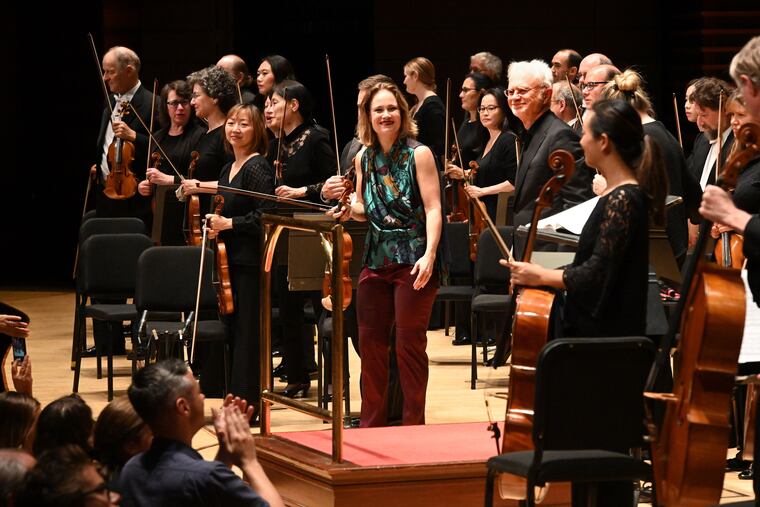John Adams is conducting the Philadelphia Orchestra in Ravel, Stravinsky — and himself — in a journey worth taking
This 21st century composer brings out the Philadelphians' best. Leila Josefowicz plays the virtuoso solo in Adams' "Scheherazade.2."

Composer-conducted concerts come with the ironclad assurance that what you’re hearing is the real thing — at least when composer and conductor are the same person.
But composer John Adams also had Ravel and Stravinsky on his Philadelphia Orchestra program Thursday at the Kimmel Center. What discoveries might be in store when the conductor takes great composers off their pedestals and approaches them as an equal?
Ravel’s Alborado del gracioso and Stravinsky’s Song of the Nightingale told you a few things about what was to come in the concert’s second half, Adams’ own Scheherazade.2. Though Adams’ conducting technique appears to be basic and businesslike, he has a keen taste for orchestral color, which has rarely seemed so brilliant, vivid, and enthralling in the Ravel, and in some of the early moments of Stravinsky.
However, such surface appeal was not about to take away from a sense of inside-out continuity. And Adams found a core tone or note or gesture in these pieces that connected and focused extended spans of music.
Adams admitted in preperformance remarks that Stravinsky’s Nightingale is “front-loaded.” Put more bluntly, it has a strong start that gives way to such spare, inward writing that the piece can seem to evaporate.
Maybe one in 10 performances, in my experience, hang together. And I’m afraid Adams’ was not one of them.
But the sense of spine in the music illustrated in many ways what was to come in his own Scheherazade.2, which is packed with musical incidents but has a sense of continuity that your ears were primed to listen for.
The Arabian Nights collection of stories, told by Scheherazade to ward off the death sentence that greeted the previous wives of the man she married, is moved to the side in this Adams rescue fantasy.
Each of the four movements envisions a more empowered Scheherazade — including an escape — with the protagonist portrayed by the virtuoso violin soloist, in this case Leila Josefowicz. The piece is something of a “dramatic symphony” in the spirit of Berlioz’s Damnation of Faust and Romeo et Juliette.
I suppose all of that is there on the surface, though my ears say it’s more of a a highly distinctive 21st century violin concerto with a strong narrative sensibility. In other words, while concertos are typically obliged to round out their ideas of an extensive and logical development, often ending somewhere in the vicinity of the beginning, Adams exercises the freedom to constantly move forward, and to end movements with anti-conclusions that give a sense of open-ended mystery.
The sumptuous scoring brings together harp, celesta, and cimbalom in deliciously close proximity. What does that have to do what this revisionist view of the Arabian Nights? Don’t know. Don’t care.
It’s also one of Adams’ best pieces, especially with the orchestra in top form and a soloist with the fearless commitment of Josefowicz, who plays almost entirely contemporary music. She has extensively championed Adams’ Violin Concerto and has played Scheherazade.2 some 50 times.
Though Adams’ music has an immediately identifiable personality, you can often tell what he has been listening to, and in the case of Scheherazade.2, the William Walton Violin Concerto often looms in the background with the spiky, mercurial, sweet-and-sour gestures. That alone makes me love it.
The second movement suggests Olivier Messiaen’s distinctively parallel harmonies. One of the more intense moments is a modified quotation from Shostakovich’s Symphony No. 4, and the final movement, when Scheherazade is said to be finding sanctuary, is something out of the late, more spiritual Sibelius symphonies.
Melody-wise, Adams chose to populate the piece with pithy motifs. He’s out to create a journey, and he won’t let you hang out at a rest stop for very long.
I just hope that more Philadelphians will take this journey in the repeat performances. For no particular reason, this city has never had as much Adams as it deserves, and with so many empty seats on Thursday, it’s a shame more people won’t hear it, especially since this music is a showcase for the Philadelphia Orchestra on the order of, say, Strauss’ Ein Heldenleben. With so many thrills, unfamiliarity with Adams’ music should not be a deterrent.
The program is repeated Friday, Sept. 27, and Saturday, Sept. 28, at the Kimmel Center. Tickets: $29. Information: 215-893-1999 or philorch.org.